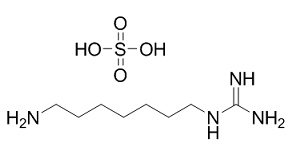All AbMole products are for research use only, cannot be used for human consumption.

BE(2)-C cells require 25 μM of GC7 Sulfate to reduce cell viability by ~50 %. Exposure to 10 and 100 μM GC7 for 72 h clearly decreases the levels of total retinoblastoma (Rb) and phosphorylated Rb as well as of Cdk4 protein, and increases the levels of p21 protein. GC7 Sulfate induces little cytotoxicity in HCC cells between 0 and 20 μM, while higher concentrations of GC7 Sulfate (50 to 100 μM) significantly inhibit the viability of all five HCC cell lines tested.
| Cell Experiment | |
|---|---|
| Cell lines | MYCN2 (±Dox) and BE(2)-C cells |
| Preparation method | Briefly, after treatment with GC7 Sulfate for 72 h at various concentrations (0.1 to 100 μM) in 96-well plates, cells are directly incubated with the MTS dye reagent for 1 h at 37°C in a 5 % CO2 atmosphere. The absorbance is read at 490 nm using a reader. |
| Concentrations | 0.1 to 100 μM |
| Incubation time | 72 h |
| Animal Experiment | |
|---|---|
| Animal models | |
| Formulation | |
| Dosages | |
| Administration | |
| Molecular Weight | 270.35 |
| Formula | C8H22N4O4S |
| CAS Number | 150417-90-6 |
| Solubility (25°C) | Water 10 mM |
| Storage |
Powder -20°C 3 years ; 4°C 2 years In solvent -80°C 6 months ; -20°C 1 month |
| Related DNA/RNA Synthesis Products |
|---|
| AV-153 free base
AV-153 free base is an antimutagenic. AV-153 free base intercalates to DNA in a single strand break and reduces DNA damage, stimulates DNA repair in human cells in vitro. AV-153 free base interacts with thymine and cytosine and has an influence on poly(ADP)ribosylation. |
| Deoxyribonucleic Acid (from Salmon sperm)
Deoxyribonucleic Acid (from Salmon sperm) can be used as a research reagent, widely used in molecular biology, pharmacology and other scientific research. |
| GSK4418959
GSK4418959 (IDE275) is a non-covalent, reversible, selective and orally active WRN helicase inhibitor. GSK4418959 inhibits ATPase and DNA unwinding functions in an ATP-competitive manner. |
| Dencatistat
Dencatistat (P115) is an inhibitor of Cytidine Triphosphate Synthase 1 (CTPS1) with an IC50 value of ≤ 0.1 μM. |
| Antipain dihydrochloride
Antipain dihydrochloride is a protease inhibitor. Antipain dihydrochloride inhibits N-methyl-N'-nitro-N-nitrosoguanidine (MNNG)-induced transformation and increases chromosomal aberrations. Antipain dihydrochloride also restricts uterine DNA synthesis and function in mice. |
All AbMole products are for research use only, cannot be used for human consumption or veterinary use. We do not provide products or services to individuals. Please comply with the intended use and do not use AbMole products for any other purpose.


Products are for research use only. Not for human use. We do not sell to patients.
© Copyright 2010-2024 AbMole BioScience. All Rights Reserved.
